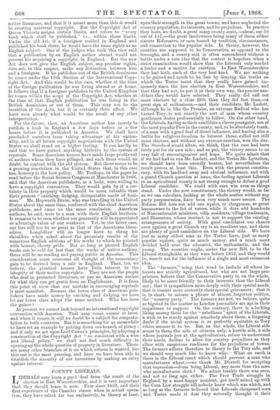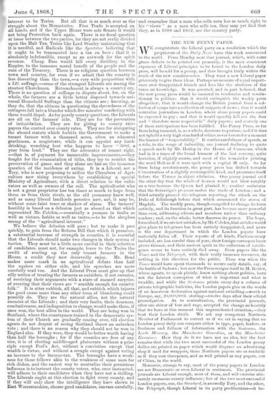COUNTY LIBERALS.
T IBERALS may learn a good deal from the result of the 1..J election in East Worcestershire, and it is very important that they should learn it now. Ever since 1832, and their first experience of the Chandos clause when in actual opera- tion, they have relied far too exclusively, in theory at least, upon their strength in the great towns, and have neglected the country population, its interests, and its prejudices. In practice they have, no doubt, a great many county seats, —about, say 50 out of 147,—the great landowners being many of them either sincere Reformers, or men bound by tradition, circumstances, and connection to the popular side. In theory, however, the counties are supposed to be Conservative, as opposed to the boroughs, and a county seat is often surrendered without a battle under a vain idea that the contest is hopeless, when a strict examination would show that the Liberals only needed a leader and a motive for exertion. In East Worcestershire they had both, each of the very best kind. We see nothing to be gained and much to be lost by denying the truths on which the Tories insist that they really have gained im- mensely since the last election in East Worcestershire, and that they had not, to put it in their own way, the precise can- didate they would have selected. They really did call out more electors by a clear fifth than they did last time,—a great sign of enthusiasm,—and their candidate, Mr. Laslett, although he is, like the Premier, an extreme Radical who has turned Tory, is not exactly the sort of man whom country gentlemen desire preferentially to follow. On the other hand, the Liberals, having as their candidate a clever youngster, son of the most popular Peer in the county, and, to be absolutely frank, of a man with a good deal of direct influence, and having also a battle for religious freedom to interest them, called out still more electors, and without any extreme exertion, won the day. The Standard would allow, we think, that the case had been fairly put for its own side ; and so put, the victory seems to us very full of encouragement and hope. We quite admit that if we had had to run Mr. Laslett, and the Tories Mr. Lyttelton, we should have been soundly beaten, but nevertheless the result proves at least this. Even with the present constitu- ency, with its landlord sway and clerical influences, and with a grand Church question at issue, the feeling against Liberals in an agricultural county is not strong enough to defeat a good Liberal candidate. We could with care win even as things stand. Under the new constituency, the victory would, as far as we can calculate, looking at the whole matter without any party prepossession, have been very much more secure. The Reform Bill does not add one squire, or clergyman, or great homeowner to the list of voters, while it does add hundreds of Nonconformist ministers, villa residents, village tradesmen, and Dissenters, whose instinct is not to support the existing arrangements of society. With good candidates our chance even against a great Church cry is an excellent one, and there are plenty of good candidates on the Liberal side. We have just as many eldest sons as the Tories have, just as many popular squires, quite as much money, and a much more decided hold over the educated, the enthusiastic, and the young. The counties ought, under the new Bill, to be the Liberal strongholds, as they were before 1832, and they would be, were it not for the influence of a single and most erroneous idea.
The " farmers," using that word to include all whose in- terests are strictly agricultural, but who are not large pro- prietors, believe that the Conservative party is, on the whole, likely to be more friendly to their interests than the Liberal one ; that it sympathizes more deeply with their special needs, that it resents more earnestly their special grievances ; that it is, in short, to misuse a phrase of almost forgotten politics, the " country party." The farmers are not, we believe, quite so bigoted in the matter as London journalists are apt in their impatience to suppose. On the contrary, there is a lurking liking among them for the " rebellious " spirit of the Liberals, a wish to be sturdy against somebody above them, a lingering doubt if the social system is so perfectly equitable as Tory ethics assume it to be. But, on the whole, the Liberal side seems to them the side of citizens only, a hostile side, a side whose journals jeer at the agriculturists, refuse to understand their needs, decline to allow for country prejudices as they allow with suspicious readiness for the prejudices of towns. The farmers adhere therefore in theory to the Tory side, and we should very much like to know why. What on earth is there in the Liberal creed which should prevent a man who manufactures wheat,—we thank Mr. Disraeli for accepting that expression—from being Liberal, any more than the man who manufactures cloth ? We admit frankly there was once, and not so long ago, either. The Free Trade struggle in England, by a most happy accident, got itself mixed up with the Corn Law struggle till nobody knew which was which, and as long as the farmers believed that Liberals cheapened corn and Tories made it dear they naturally thought it their interest to be Tories. But all that is as much over as the struggle about the Monasteries. Free Trade is accepted on all hands, and if the Upper House were sole Senate it would not bring Protection back again. There is no fiscal question at issue between the two parties, for they are not really divided upon the Malt Tax, Tories like Lord Stanley maintaining that it is needful, and Radicals like the Spectator believing that it ought to be transmuted into a tax on beer ; that it is absolutely indefensible, except as an outwork for the spirit revenue. Cheap Bass would kill every distillery in the Empire, to the immense moral benefit of the people and the ruin of the Treasury. There is no religious question between town and country, for even if we admit that the country is less dissenting than the town,—a very wide proposition with a 121. suffrage,—some of the strongest Liberals are among the stoutest Churchmen. Retrenchment is always a country cry. There is no question of suffrage to dispute about, for, on the whole, the farmers are a little better disposed towards uni- versal Household Suffrage than the citizens are ; knowing, as they do, that the citizens in questioning the shrewdness of the cottagers fall into a blunder which five minutes' marketing with them would dispel. As for purely county questions, the Liberals are all on the farmers' side. They are for the prevention of intimidation. They are for giving to county rate- payers the control over county rates. They are for abrogating the absurd statute which forbids the Government to make a tenant farmer with a thousand acres, often an educated gentleman, a magistrate, while it can appoint any hard- drinking, wenching lout who happens to have " 300/. a year from land." They are the advocates of tenant right, —that is, of payment for immovable improvements,—they fought for the commutation of tithe, they try to restrict the preservation of game, and they alone are fair on the immense question of the incidence of rating. It is a Liberal, not a Tory, who is now proposing to utilize the Chambers of Agri- culture now rising everywhere by establishing a special Ministry of Agriculture, with a direct relation to the culti- vators as well as owners of the soil. The agriculturist who is not a great proprietor has ten times as much to hope from them as from their rivals, as the old yeomanry knew well, and as many liberal landlords perceive now, not, it may be, without some faint trace or shadow of alarm. The farmers' hostility is based on a delusion just as absurd as that which represented Mr. Cobden,—essentially a yeoman in faults as well as virtues, habits as well as tastes,—to be the sleepless enemy of the " agricultural interest."
We believe the delusion will pass ; but to make it pass quickly, to gain from the Reform Bill that which it promises, a substantial increase of strength in counties, it is essential that the Liberals should make two changes in their system of tactics. They must be a little more careful in their selection of candidates, must not, for example, leave to the Tories the credit of sending up the only tenant farmers in the House, a credit they now deservedly enjoy. Mr. Read makes more mark in an agricultural debate than half the squires on either side, and his speeches are more carefully read too. And the Liberal Press must give up that silly notion of treating the farmers as outsiders, if not enemies, of receiving their arguments with a stare of amused surprise, of averring that their views are " sensible enough for country folk." It is utter rubbish, all that, and rubbish which injures the good cause more than any other form of blundering could possibly do. They are the natural allies, not the natural enemies of the Liberals ; and their very faults, their dourness, combativeness, and indisposition to change, would make them, if once won, the best allies in the world. They are being won in Scotland, where the countrymen trained in the democratic sys- tem of their Church are gradually coming over, till election agents do not despair of seeing Scotland throw an unbroken vote ; and there is no reason why they should not be won in England also. If they were, they would be better worth having than half the boroughs ; for if the counties are free of any vice, it is of electing middle-aged plutocrats without a prin- ciple except Peel's Act, without a conviction except that wealth is virtue, and without a scruple except against voting an increase to the income-tax. The boroughs have a weak- ness for those fellows akin to the weakness of some men for rich dishes, and the easiest way to neutralize their pernicious influence is to instruct the county voters, who, once instructed, will adhere to their candidates when they have not a shilling. The Liberals ought at this election to fight every county, and if they will only show the intelligence they have shown in East Worcestershire, choose good candidates, canvass carefully, and remember that a man who sells corn has as much right to his " views " as a man who sells tea, they may yet find that they, as in 1688 and 1832, are the country party.



































 Previous page
Previous page